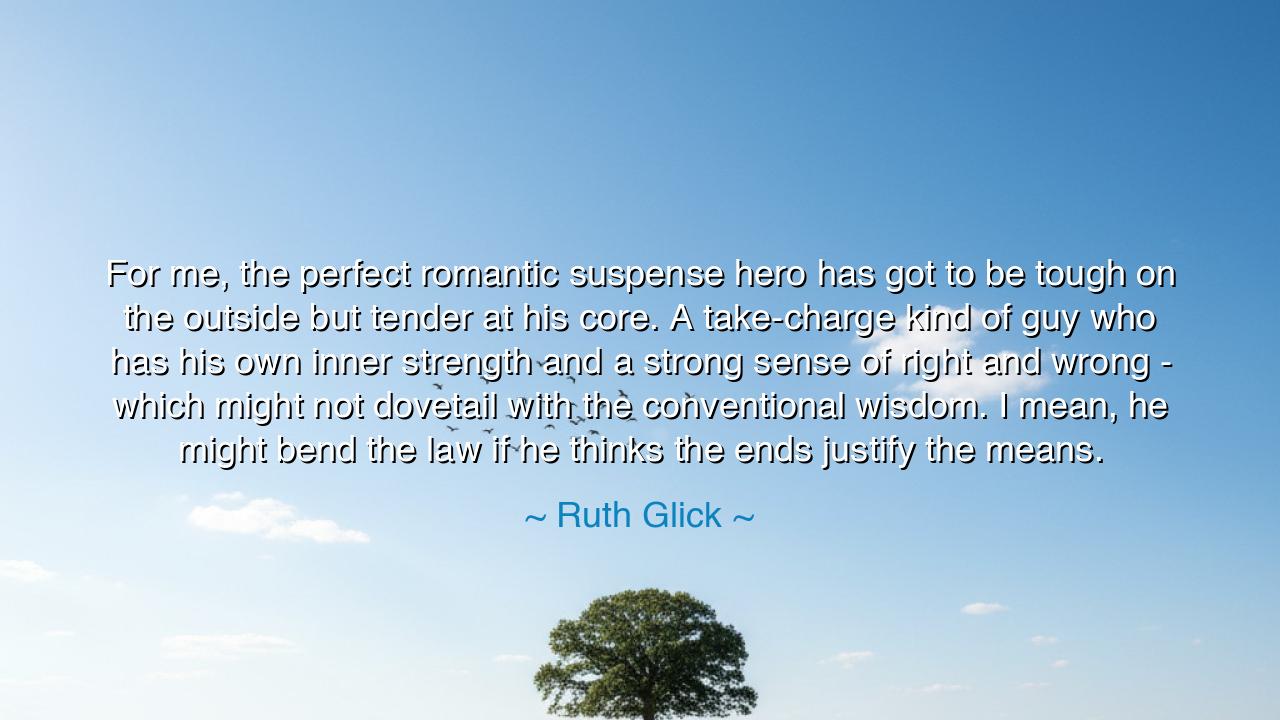
For me, the perfect romantic suspense hero has got to be tough on
For me, the perfect romantic suspense hero has got to be tough on the outside but tender at his core. A take-charge kind of guy who has his own inner strength and a strong sense of right and wrong - which might not dovetail with the conventional wisdom. I mean, he might bend the law if he thinks the ends justify the means.






"For me, the perfect romantic suspense hero has got to be tough on the outside but tender at his core. A take-charge kind of guy who has his own inner strength and a strong sense of right and wrong - which might not dovetail with the conventional wisdom. I mean, he might bend the law if he thinks the ends justify the means." These words, spoken by Ruth Glick, bring to life the character of a hero who embodies the duality of strength and tenderness, a figure who stands at the crossroads of moral complexity. This archetype, deeply ingrained in literature and mythology, is not merely about physical prowess or stoic resolve, but about the inner tension between personal integrity and the pressures of the world. The romantic suspense hero is a figure of contradictions, someone who lives by a code that might not always align with society’s laws, yet whose heart beats for justice and truth.
From the ancient myths, we see that the hero is often caught between two opposing forces: the external world, which demands strength and resilience, and the inner self, which craves compassion and empathy. Hercules, the mighty hero of Greek myth, is a perfect example of this type. Though known for his unparalleled strength and his twelve labors, Hercules was also a figure torn by the tenderness of his love for family and friends. His story is one of immense personal struggle—as he navigates between the demands of gods and men, he is often forced to make decisions that question the very morality of his actions. Hercules did not always adhere to the conventional wisdom, but his heart remained loyal to a code of honor, making him a hero not just by his strength, but by the moral choices he made, often under immense pressure.
The romantic suspense hero that Glick describes is one who draws from the ancient archetypes but is uniquely adapted to the complexities of modern life. This hero does not fit neatly into society’s ideal of the perfect man, because he is not afraid to bend the rules when his inner strength calls for it. Robin Hood, the outlaw of medieval legend, embodies this spirit. A man of action, yet deeply guided by his own sense of justice, he robs from the rich to give to the poor, challenging the conventional wisdom of his time. His actions break the laws of the land, but his motivations stem from a desire to restore balance, to right the wrongs that the law itself fails to address. Like the heroes of old, Robin Hood’s strength comes not from blind obedience to authority, but from the tenderness he shows to the oppressed and the weak.
Similarly, the modern-day romantic suspense hero is a figure who takes charge of his world, yet is not immune to the moral dilemmas that arise when the law seems unjust. The tension between his outer strength and his inner compassion creates a dynamic character who is as relatable as he is inspiring. He does not seek to be a perfect man, but a man of action who, in moments of crisis, is guided by a strong sense of right and wrong, even if it leads him to challenge the very systems that demand conformity. His strength is not just physical but lies in his ability to stay true to himself, even when the world around him falls into chaos.
Consider the character of Jack Bauer from the television series 24, a man who continually faces decisions that force him to choose between morality and the greater good. He is a man who can be as ruthless as the threats he faces, but at his core, he is driven by a desire to protect the innocent. His ability to make hard, often controversial decisions—such as using torture to extract information—reveals the complexity of the modern hero, who must balance the need to act decisively with the consequences of those actions. His inner struggle is one of conflicting ideals: he seeks justice, yet is forced to break the law to achieve it.
The lesson from Ruth Glick’s words, and from these ancient and modern examples, is that the true hero is not defined by the simplicity of his actions but by the depth of his moral complexity. The path of the hero is not one of clear-cut answers, but of navigating the murky waters of gray areas. To be truly great, the hero must possess both strength and tenderness, be willing to bend the rules when necessary, but always with the understanding that his actions must serve a higher good. It is the balance between courage and compassion, between action and reflection, that defines the character of the true hero.
In your own life, seek not the path of ease, where answers are simple and consequences are clear. Embrace the complexity of the world, where actions are not always easy to define, but your inner compass of justice and compassion will guide you. Like the hero of romantic suspense, cultivate both your outer strength and your inner tenderness. Trust in your ability to make decisions that align with your personal moral code, even if the world around you seems to demand conformity. Just as the heroic figures of the past navigated the tension between law and justice, so too can you create a life that reflects both action and heart.






AAdministratorAdministrator
Welcome, honored guests. Please leave a comment, we will respond soon